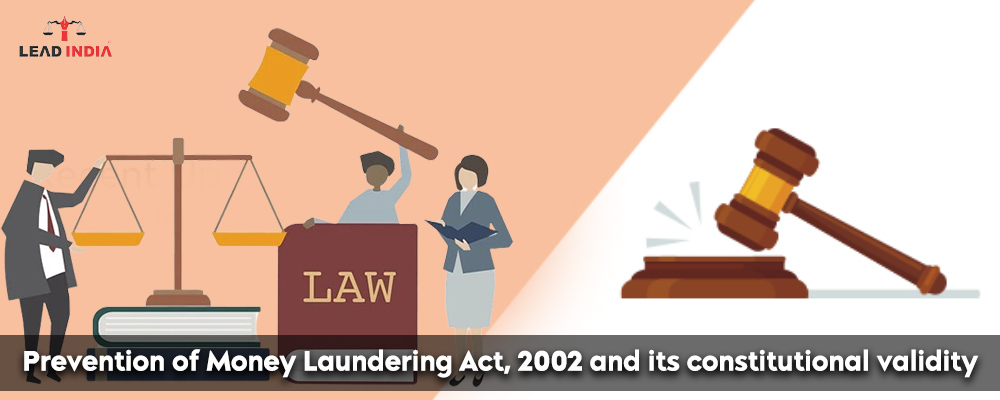The Prevention of Money Laundering Act,2002 went into effect on July 1, 2005, and its main purpose, as stated in the Act’s Preamble, was to prevent money laundering, to provide for the confiscation of property derived from or involved in money laundering, and to punish those who commit money laundering.
The constitutionality of the PMLA
Since the Act’s introduction, the provisions have been classified as both difficult and problematic. They have been in the spotlight due to their conflicting interests with many Acts, and the constitutionality of various provisions of the PMLA,2002 has been questioned in court on numerous occasions in various case laws.
- Section 45(1) of the 2002 PMLA deals with bail requirements. This harsh clause was declared illegal and in violation of Articles 14 and 21 of the Indian Constitution in the landmark case of Nikesh Tarachand Shah v. Union of India (2017). Section 45(1) of the Act was struck down in this decision, and the 2018 Finance Amendment Act later changed it. The line “punishable for a term of imprisonment of more than three years under Part A of the Schedule” in the provision was replaced by “under this Act”. This was done to ensure that the bail prerequisites listed in this section apply to all offenses under this Act rather than only Section 45(1).
- This amendment has also been challenged, with various High Courts presenting opposing views. In the case of M Sivasankar v. Union of India (2021), the Kerala High Court stated that the bail conditions would be valid after the 2018 amendment, and the judgment of Nikesh Tarachand Shah will not alter the applicability of the following amendment.
- In the case of B Rama Raju v. Union of India and Others (2019). Sections 2(1)(u), 8, and 23 were challenged for their constitutionality. After evaluating these provisions as well as the Act’s purpose, the Court reached its decision. Parliament has the authority to apply any Act retrospectively, the presumption under Section 23 is rebuttable, allowing the accused to prove his innocence. So the Court ruled that these provisions do not violate any of the Constitution’s fundamental rights and upheld their constitutionality.
- In the case of J Sekar v. Union of India (2017), the Court found that Section 5 (1) does not violate Article 14 since it does not provide excessive or disproportionate powers that will be rendered arbitrary, relying on the landmark decision of Shayara Bano v. UOI (2017).
- Section 19 of the Act addresses the powers of arrest, while Section 24 addresses the burden of proof. These clauses were challenged in the case of Rajbhushan Omprakash Dixit v. Union of India and others (2018). The Court relied on the decision in Moin Akhtar Qureshi v. Union of India (2017), which stated that the provisions of Section 19(1) do not fit with the principles of the Constitution and should be examined by a bigger bench.
Need A Legal Advice
The internet is not a lawyer and neither are you. Talk to a real lawyer about your legal issue

Following the 2019 Amendment, the provisions of Sections 17(1) and 18(1) were eliminated, resulting in a broader scope of authority for Enforcement Directorate officials. According to ECIR under the PMLA Act a FIR under the Cr.P.C. cannot be compared to an ECIR and FIR under the Cr.P.C. cannot be compared to an ECIR. The Punjab and Haryana High Court has declared that the High Court cannot use its inherent power under Section 482 CrPC to revoke an Enforcement Case Information Report (ECIR) that the Enforcement Directorate (ED) filed under the Prevention of Money Laundering Act, 2002 (PMLA). The court will assess whether these provisions are constitutionally valid.
In Vijay Madanlal Choudhary v. Union of India, 2022, the Supreme Court upheld the constitutionality of several provisions of the Prevention of Money Laundering Act, 2002 (PMLA), including the Directorate of Enforcement’s (ED) powers of arrest and seizure, the presumption of innocence, and stringent bail conditions. The Supreme Court panel hearing the batch of applications requesting reconsideration of the verdict was recently dissolved.
Lead India offers various legal services, such as free legal advice and internet information. We provide a facility in which you can talk to a lawyer and ask legal questions regarding the law here. Lead India’s lawyers can assist you with any legal issues. In India, Lead India provides free legal assistance online. In addition to receiving free legal advice online, Lead India allows users to pose inquiries to experts for free.



